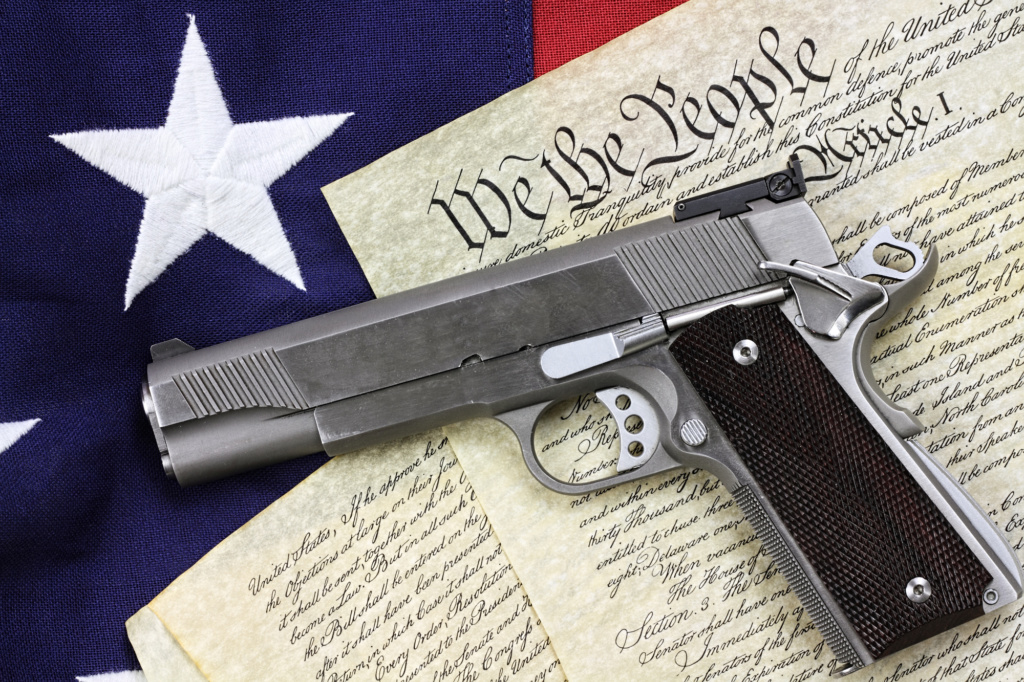2ND AMENDMENT TO THE CONSTITUTION OF THE UNITED STATES OF AMERICA
“A well regulated Militia, being necessary to the security of a free State, the right of the people to keep and bear Arms, shall not be infringed.”

“…shall not be infringed”…except for those who meet the criteria of the Lautenberg Act of 1996, most commonly referred to as the Domestic Violence Gun Ban.
Domestic Violence Offender Gun Ban 101
The basic summary of the federal law is that domestic abuse results in prohibition of the convicted person’s gun ownership, with violations of the ban carrying penalties including up to 10 years in prison and/or a $250,000 fine. While particulars vary from state to state, with some being more strict than others, the federal guidelines come down to two things:
- The individual has been convicted (not accused, not charged – convicted) of a felony or misdemeanor domestic violence.
- The victim has a restraining order against the convicted individual.
As federal laws rule over the state, no state can write a law that would circumvent these rules. This ban can apply to service members, law enforcement officer personnel, and other government positions that may commonly be armed — which can be a major career impediment. Jobs may be able to work with established employees to find a new position, but it will be far more difficult to obtain employment if the hiring position requires gun use (such as a security guard).
Should you be active duty military, the effects of the ban can have a much bigger impact on your daily life than they would for someone who owns guns strictly for personal use. Your command is obligated to retrieve any issued firearms as well as secure your access to any others. The Command Judge Advocate will review the case to see if your conviction prevents you from using firearms. If so, you will be unable to complete any requirements that require the use of firearms or ammunition. This could result in missing qualifications, such as marksmanship, or being declared non-deployable. The best case scenario is that you could be assigned to a detail not involving firearms. (Large-scale weapons are not considered firearms under the Lautenberg Amendment). The worst case scenario would be involuntary discharge with less than an honorable title due to being unable to perform work duties. This does not include any military punishment should command decide to pursue military law violations in addition to the civilian punishment.
Are There Any Absolute Defenses to the Ban?
An absolute defense is a legal recognition that whatever incident was committed was justifiable enough to not warrant legal involvement (i.e. not paying a contractor who caused damage versus provided the agreed service is unlikely to yield a decision that favors the contractor). There are two defenses, available by statute, to the gun ban.
- A person entitled to a jury trial was tried by the jury and made a waiver to the right of counsel.
- The conviction has been expunged or is a pardoned offense, unless such expungement, or pardon, expressly states otherwise.
How Long is the Ban Upheld?
The Domestic Violence Offender Gun Ban is permanent. Once gun rights have been revoked, it is almost impossible to have them reinstated. This is why it is best to lay the groundwork to protect your rights before the first court date.
What is a Deferred Judgment and Sentence?
The defendant of a misdemeanor domestic violence case can sometimes be offered a Deferred Judgment and Sentence. These agreements usually consist of a guilty plea and sentencing, with the understanding that the case will be totally dismissed based on future good behavior. Though these laws are not entirely clear, the general consensus is that gun rights are terminated until the deferment is successfully completed. This means the sentence and good behavior requirements are both satisfied.
What Should you do to Prepare for the Hearing?
You have two options. Trust the system and represent yourself, or speak with an attorney. Things that an attorney can do for you include:
- Converse with the claimant directly, even if you are not permitted to.
- Request modifications to a restraining order to make it less restrictive.
- Directly negotiate with the district attorney to plea bargain gun possession.
- Represent you in court to declare your innocence.
- Navigate sentencing should there be a conviction.
- Perform all of this on the civil side of the law.
- Find assistance for serial offenders to help end the cycle of violence.
- Tell you exactly what you are to do, and not to do, for each step of the case.
Making wise decisions after an alleged incident can help you keep your gun rights even in the face of a conviction. This is not the time to take uneducated steps. The wrong move could prevent you from being able to keep your gun rights from losing them when you normally wouldn’t have. Be sure to speak with an attorney to help keep the coin toss from landing face down on you. Leyba Defense has trained attorneys in domestic violence cases to ensure you are best represented in the case against you. Contact us today for a consultation or if you have any questions.
